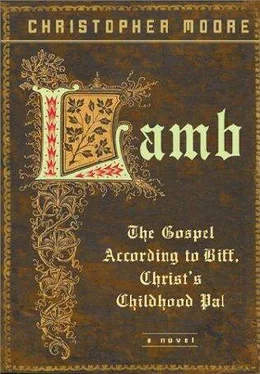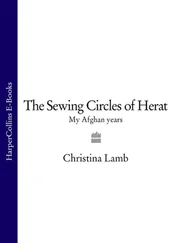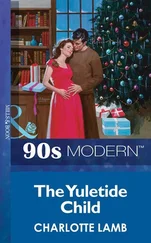“You’d think they’d have found one by now,” Mary said.
According to prophecy, Joshua was supposed to enter the city on the colt of a donkey. Of course, no one was going to find one. That was the plan. Even Joshua’s brother James had agreed to be part of the conspiracy. He’d gone ahead to wait inside the gate, just in case one of the disciples had missed the point and actually came back with a donkey.
About a thousand of Joshua’s followers from Galilee had gathered on the road to the Golden Gate. They had lined the road with palm fronds for Joshua’s entrance to the city, and they were cheering and singing hosannas all afternoon in anticipation of his triumphant entrance, but as the afternoon wore into evening, and no colt showed, the crowd gradually dispersed as everybody got hungry and went into the city to find something to eat. Only Joshua, his mother, and I were still waiting.
“I was hoping you might talk some sense into him,” I said to Mary.
“I’ve seen this coming for a long time,” Mary said. She wore her usual blue dress and shawl, and the usual light in her face seemed faded, not by age, but by grief. “Why do you think I sent for him two years ago?”
It was true, she had sent Joshua’s younger brothers Judah and Jose to the synagogue at Capernaum to bring him home, claiming he was mad, but Joshua hadn’t even gone outside to meet them.
“I wish you two wouldn’t talk about me like I’m not here,” Joshua said.
“We’re trying to get used to it,” I said. “If you don’t like it, then give up this stupid plan to sacrifice yourself.”
“What do you think we’ve been preparing for all of these years, Biff?”
“If I’d known it was this I wouldn’t have helped. You’d still be stuck in a wine amphora in India.”
He squinted to see through the gate. “Where is everyone? How hard can it be to find one simple ass?”
I looked at Joshua’s mother, and although there was pain in her eyes she smiled. “Don’t look at me,” she said. “No one on my side of the family would ever sacrifice a straight line like that.”
It was too easy, so I let it go. “They’re all at Simon’s house in Bethany, Josh. They aren’t coming back tonight.”
Joshua didn’t say a word. He just climbed to his feet and walked off toward Bethany.
“There is nothing you can do to stop this from happening!” Joshua screamed at the apostles, who were gathered in the front room of Simon’s house. Martha ran from the room crying when Joshua glared at her. Simon looked at the floor, as did the rest of us. “The priest and the scribes will take me, and put me on trial. They will spit on me and scourge me and then they will kill me. I will rise from the dead on the third day and walk among you again, but you cannot stop what must happen. If you love me, you will accept what I’m telling you.”
Maggie got up and ran out of the house, snatching the communal purse from Judas as she went. The Zealot started to rise to go after her but I pushed him back down on his cushion. “Let her go.”
We all sat there in silence, trying to think of something to do, something to say. I don’t know what everyone else was thinking, but I was still trying to formulate some way for Joshua to make his point without giving his life. Martha returned to the room with wine and cups and served each of us in turn, not looking at Joshua when she filled his cup. Joshua’s mother followed her back out of the room, I presumed to help her prepare supper.
In time, Maggie came back, sliding through the door and going directly to Joshua, where she sat down at his feet. She took the communal purse out of her cloak and from it she pulled a small alabaster box, the sort that was used to store the precious ointments that women used to anoint the bodies of the dead at burial. She tossed the empty purse to Judas. Without a word, she broke the seal on the box and poured the ointment on Joshua’s feet, then untied her long hair and began to wipe the oil from his feet with it. The rich aroma of spices and perfume filled the room.
In an instant Judas was on his feet and across the room. He snatched the box of ointment off the floor. “The money from this could have fed hundreds of the poor.”
Joshua looked up at the Zealot and there were tears in his eyes. “You’ll always have the poor, Judas, but I’m only here for a short while longer. Let her be.”
“But…”
“Let her be,” Joshua said. He held out his hand and Judas slammed the alabaster box into it, then stormed out of the house. I could hear him shouting out in the street, but I couldn’t make out what he was saying.
Maggie poured the rest of the oil on Joshua’s head and drew patterns on his forehead with her finger. Joshua tried to take her hand but she pulled it away from him and stepped back until he dropped his hand. “A dead man can’t love,” she said. “Be still.”
When we followed Joshua to the Temple the next morning, Maggie was nowhere to be seen.
On Monday Joshua led us through the Golden Gate into Jerusalem, but this time there were no palm fronds laid on the road and no one was singing hosannas. (Well, there was this one guy, but he was always singing hosannas at the Golden Gate. If you gave him a coin he’d stop for a while.)
“It would be nice to be able to buy a little something for breakfast,” Judas said. “If the Magdalene hadn’t spent all of our money.”
“Joshua smells nice, though,” Nathaniel said. “Don’t you think Joshua smells nice?”
Sometimes you find yourself grateful for the most unlikely things. Right then, when I saw Judas grit his teeth and the vein stand out on his forehead, I said a quick prayer of thanks for Nathaniel’s naïveté.
“He does smell nice,” said Bartholomew. “It makes one want to reassess one’s values regarding the material comforts.”
“Thank you, Bart,” said Joshua.
“Yes, there’s nothing like a good-smelling man,” said John dreamily. Suddenly we were all very uncomfortable and there was a lot of throat-clearing and coughing and we all walked a few paces farther apart. (I haven’t told you about John, have I?) Then John started to make a great and pathetic show of noticing the women as they passed. “Why, that little heifer would give a man some strong sons,” John said in a booming and falsely masculine voice. “A man could surely plant some seed there, he could.”
“Please shut up,” James said to his brother.
“Maybe,” said Philip, “you could have your mother come over and tell that woman to cleave unto you.”
Everyone snickered, even Joshua. Well, everyone except James. “You see?” he said to his brother. “You see what you’ve started? You little nancy.”
“There’s a nubile wench,” exclaimed John unconvincingly. He pointed to a woman who was being dragged toward the city gates by a group of Pharisees, her clothes hanging in shreds on her body (which indeed appeared to be nubile, so credit to John for working outside of his element).
“Block the road,” Joshua said.
The Pharisees came up to our human blockade and stopped. “Let us pass, Rabbi,” the oldest of them said. “This woman has been caught in the act of adultery this very day and we’re taking her out of the city to be stoned, as is the law.” The woman was young and her hair fell in dirty curls around her face. Terror had twisted her face and her eyes were rolled back in her head, but an hour ago she had probably been pretty.
Joshua crouched and began writing in the dust at his feet. “What’s your name?” he asked.
“Jamal,” said the leader. I watched Joshua write the man’s name, then next to it a list of sins.
“Wow, Jamal,” I said. “A goose? I didn’t even know that was possible.”
Читать дальше










